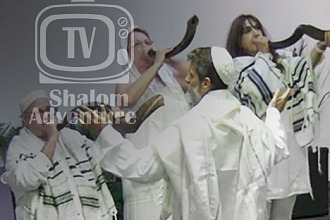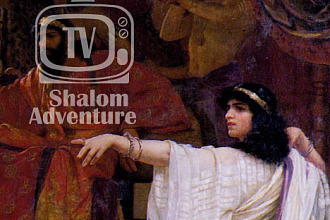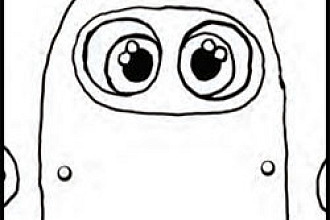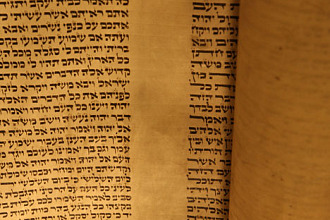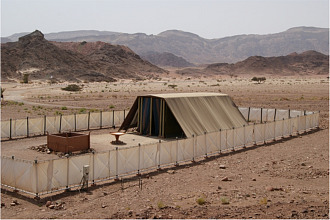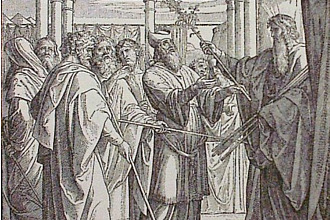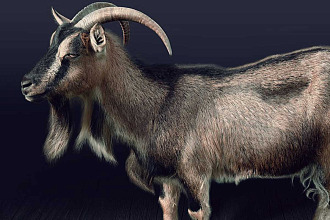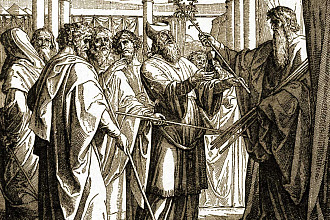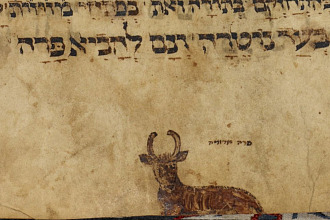Parasha for the Week: Toldot: Genesis 25:19-28:9.
Haftarah for the Week: Malachi 1:1-27.
Besorat Yeshua: Mark 11:15-25.
Overview
After 20 years of marriage, Yitzchak's prayers are answered, and Rivka conceives twins.
The pregnancy is very painful. G-d reveals that the suffering is a microcosmic prelude to the worldwide conflict that will rage between the two great nations descended from these twins.
Esav is born, and then Yaakov, holding Esav's heel.
Esav becomes a hunter, a man of the physical world, whereas Yaakov sits in the tents of Torah developing his spiritual life.
Yaakov is cooking lentils, the traditional mourner's meal. Esav rushes in, ravenous from a hard day’s hunting, and sells his birthright (and its spiritual responsibilities) for a bowl of lentils, demonstrating his unworthiness for the position of firstborn.
A famine strikes Canaan, and Yitzchak thinks of escaping to Egypt; but G-d tells him that he must remain in the Holy Land.
The Philistines grow jealous of Yitzchak when he becomes immensely wealthy, and Avimelech the king asks him to leave.
Yitzchak re-digs three wells dug by his father. Avimelech, seeing that Yitzchak is blessed, makes a treaty with him.
When Yitzchak senses his end approaching, he summons Esav to give him his blessings. Rivka, acting on a prophetic command that the blessings must go to Yaakov, arranges for Yaakov to impersonate Esav and receive the blessings.
When Esav in frustration reveals to his father that Yaakov has bought the birthright, Yitzchak realizes that the birthright has been bestowed correctly on Yaakov and confirms the blessings he has given Yaakov.
Esav vows to kill Yaakov, so Rivka sends Yaakov to her brother Lavan where he may find a suitable wife.
Name of the Twins
The Torah relates why they were named Esav and Yaakov. "And the first born came out red, full of hair like a hairy garment; and they called his name Esav. After came his brother and his hand was holding the heel of Esav, and he called his name Yaakov (Jacob)." Thus, the name Esav comes from the word grass in Hebrew, for the way he looked at birth, "like a hairy garment." The name Yaakov is from the word Eikev which means heel also for the way he was born, "holding on to the heel of Esav."
A Deserved Blessing
When Yitzchak told Esav to bring him food so that he may bless him, Rivka prepared the food and had Yaakov bring it to Yitzchak instead. Yaakov, dressed in Esav's clothes, pretended to be Esav; Yitzchak exclaimed, "The voice is the voice of Yaakov but the hands are the hands of Esav." The blessings which Yitzchak gave to Yaakov begin, "May G-d give you of the dew of the heaven and of the fat of the earth . . ." To Esav, Yitzchak later reversed the blessing and said, "Of the fat places of the earth shall be your dwelling and of the dew from heaven above . . ."
Our sages explain that the blessing to Yaakov, patriarch of God's people, was that "heavenly matters" come first. That faithfulness to God will bring material success. "The fat of the earth," should be secondary, a means, in order to achieve the spiritual goal.
Jews and Miracles
The birth of the Jewish nation is associated with miracles. Sarah gave birth to Yitzchak at the age of 90, defying the laws of nature. Jacob's birth was also a result of the prayers of his parents. Indeed, Jewish existence and survival, throughout the generations, is connected with miracles, prayer, and the forces beyond nature.
HAFTARAH Malachi 1:1 - 27
Parasha: This week's Parasha is about Yaakov and Esau. "The first came out red, all his body like a hairy mantle; so they named him Esau. Afterward his brother came out, with his hand gripping Esau's heel; so he was named Jacob. Isaac was sixty years old when she bore them." (Genesis 25-26).
Haftarah: The haftarah is also about Yaakov and Esau. "I have loved you, says the LORD. But you say, "How have you loved us?" Is not Esau Jacob's brother? says the LORD. Yet I have loved Jacob" (Malachi 1:1).
Besorah: In this Besorah, the priests and the leaders deserved the reproaches of God: "Is it not written, 'My house shall be called a house of prayer for all the nations? But you have made it a den of robbers." And when the chief priests and the scribes heard it, they kept looking for a way to kill him; for they were afraid of him, because the whole crowd was spellbound by his teaching" (Mark 11:17-18). That's why they wanted to kill Yeshua.
Haftarah: The priests and the leaders deserved the reproaches of God, "O priests, who despise my name. You say, "How have we despised your name?" By offering polluted food on my altar. And you say, "How have we polluted it?" By thinking that the LORD'S table may be despised. When you offer blind animals in sacrifice, is that not wrong? And when you offer those that are lame or sick, is that not wrong? Try presenting that to your governor; will he be pleased with you or show you favor? says the LORD of hosts (Malachi 1:6-8).
Besorah: Yeshua entered the temple and was not happy: "And he entered the temple and began to drive out those who were selling and those who were buying in the temple, and he overturned the tables of the money changers and the seats of those who sold doves" (Mark 11:15).
Haftarah: The Prophet Malachi is the voice of God and says that God is not happy with what happens in the temple. "Oh, that someone among you would shut the temple doors, so that you would not kindle fire on my altar in vain!" (Malachi 1:10). But there is hope: For the lips of a priest should guard knowledge, and people should seek instruction from his mouth, for he is the messenger of the LORD of hosts (Malachi 2:7).
Besorat Yeshua: Mark 11:15 - 25
Parasha: Yaacov is shocked by the behavior of Esau. He knows that he is not spiritual and does not deserve the firstborn's rights.
Besorah: Yeshua entered the temple and is shocked by what he sees: "Then they came to Jerusalem. And he entered the temple and began to drive out those who were selling and those who were buying in the temple, and he overturned the tables of the money changers and the seats of those who sold doves" (Mark 11:15).
Parasha: Yaacov had a similar character as Yeshua; he was a spiritual man who liked to meditate and to pray, "while Jacob was a quiet man, living in tents" (Genesis 25:27).
Besorah: Yeshua reminds Israel the first purpose of the Temple is to be a house of prayer for all nations. "Is it not written, 'My house shall be called a house of prayer for all the nations'? " (Mark 11:17).
Parasha: Rivka is a great lady, full of faith. She knows the promise God gave to Abraham and Yitzhak. She has faith in the future of her son Yaakov, because she knows he is the more spiritual of her sons. That is why she was prepared to do everything for Yaakov. She knew that he was the man who was to receive the promises and the blessings. "Now therefore, my son, obey my word as I command you" (Gen. 27:8) .
Besorah: Yeshua on the earth was a man of faith, a man who knew what would be in the future and who invited his disciples to have faith. "Yeshua answered them, "Have faith in God" (Mark 11:22).
Parasha: Esau is not happy. For him what happened was not fair, and wanted to kill his brother. "Now Esau hated Jacob because of the blessing with which his father had blessed him, and Esau said . . . I will kill my brother Jacob" (Gen. 27:41).
Besorah: The leaders of God's people wanted to kill Yeshua. "And when the chief priests and the scribes heard it, they kept looking for a way to kill him" (Mark 11:18).





